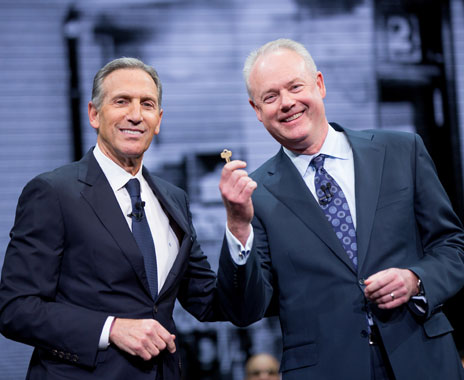Outgoing Starbucks president and CEO Howard Schultz said there’s no reason to worry about the company, despite the fact that this is one of the few times Starbucks shares have not increased over the year.
Schultz, speaking Wednesday at the company’s 25th annual meeting of shareholders, said the company is investing in the future and that 2016 was “one of the best, strongest, and most meaningful years” in company history.
Starbucks outlined its plan for the future during the meeting, one that will focus on human connection, relevant innovation, and the company’s fastest growing market, China, as it moves forward with new president and CEO Kevin Johnson.
Digital growth
With 26,000 stores across 75 countries, Starbucks brings in 90 million customers per week. As the company continues growth, it plans to increase throughput and improve the customer experience through digital platforms.
Mobile order and payment now represents more than 8 percent of all transactions in Starbucks U.S. locations, and the company has about 9 million mobile-paying customers.
Now available to more than 100,000 customers across the U.S., the My Starbucks Barista platform will be rolled out nationwide later this year. With the platform, customers can place orders via voice command or through their messaging interface before going to a Starbucks for pickup. The brand also plans to integrate its platform with Amazon Alexa and Ford, so customers with those voice-activation platforms can order beverages on the go.
Beginning in April, customers can purchase Starbucks gift cards through Apple’s Messages app and pay with Apple Pay. With the introduction of the Outlook add-in, customers can also gift beverages through Microsoft Outlook.
Tea and coffee innovations
Tapping into the barrel-aged-beverage trend, Starbucks recently launched whiskey barrel–aged Starbucks Reserve coffee out of its Seattle Roastery, which serves as the company’s innovation incubator.
With the opening of new Roasteries in Tokyo, Milan, Shanghai, and New York City, Starbucks will continue expanding its premium coffee pipeline, and Schultz said there is potential for 20–30 Roasteries globally. Schultz, who will remain chairman of the board, will now focus on Starbucks’Reserve Roasteries and Retail stores.
Starbucks will also launch Teavana Shaken Iced Tea Infusions with no artificial flavors or sweeteners this summer.
Menu developments
Starbucks will capitalize on a big opportunity to bring in lunch traffic with the launch of its “Mercato” lunch program in 100 Chicago-area stores next month.
The program will showcase salads and sandwiches that are made fresh daily in each location, with the unsold portions being donated to Starbucks’ hunger relief program, FoodShare, run in conjunction with Feeding America.
Johnson said during the shareholder meeting that Starbucks will continue to expand its gluten-free choices and capacity for new menu items, like its sous-vide egg bites, which were introduced in January and have been popular with guests.
The company plans to double its food business by 2021.
China expansion
China represents Starbucks’ biggest opportunity for growth, and the brand will continue to invest in the country. It now has 2,600 stores in 127 Chinese cities, and opens stores at a rate of more than one per day.
“We are committed to double the number of stores in China over the next five years,” Johnson said.
In China, the company also launched a social gifting feature called Say It With Starbucks, which allows customers to gift a Starbucks beverage or digital gift card through Weixin, a sister product of the popular Chinese platform WeChat. The company has seen more than 1 million transactions through the gifting feature since it launched in China on February 10.
Hiring commitments
Starbucks says it plans to create more than 68,000 jobs in the U.S. as it opens 3,400 new stores by 2021.
To fillnew roles, Starbucks will up its commitment to hiring veterans and military spouses, as well as youth not in school or unemployed.
The company surpassed its goal to hire 10,000 veterans and military spouses by the 2018 deadline, and now plans to increase its hiring goal to 25,000 by 2025. Starbucks also exceeded its 10,000-employee hiring goal for opportunity youth by 30,000 hires, and now plans to increase that to 100,000 hires by 2020.
Earlier this year, Starbucks announced its plans to hire 10,000 refugees across its global business in 75 countries by 2022.
“We recognize what our responsibility is in addition to making a profit,” Schultz said. “We have for decades been driven by principles, guided by a set of beliefs that are steeped in humanity.”



